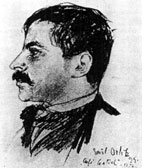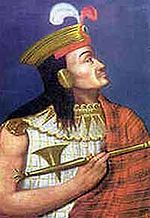The gold of Caxamalca
The Gold of Caxamalca is a historical short story by Jakob Wassermann that appeared in Vienna in 1923 together with two other stories in a collection entitled The Pilgrim's Spirit . It tells of the captivity and death of the Inca ruler Atahuallpa during a campaign under General "Francesco Pizarro" ( Francisco Pizarro ) against the Peruvians in 1532 and 1533 from the perspective of the narrator Domingo de Soria Luce . As stated in the title, the setting is the old Inca city of Cajamarca . The climax of the action is the battle of Cajamarca , the execution of the Inca ruler and the massacre of the Inca.
Wassermann used the book Conquest of Peru by William Hickling Prescott from 1847 as a source. The extent to which the allegation of plagiarism is justified is still discussed today.
The focus of Wassermann's portrayal of the events is the contrast between Atahuallpa, portrayed as the “ noble savage ”, and the immoderate greed for gold of the Spaniards and the impurity that has come with them over the country and paralyzes Atahuallpa. The book is widespread school reading in middle school, especially in high schools (7th / 8th grade).
Table of contents
- 1st chapter
Thirteen years after the conquest of Peru , the stuttering knight Domingo de Soria Luce has withdrawn as a monk in a monastery in the city of Lima . Anno 1562, thirty years after the events, Domingo tells of the last months in the life of the Inca ruler Atahuallpa:
- 2nd chapter
In 1532, Domingo moved as an officer and knight under General Francesco Pizarro for seven days over the immense mountains of the Cordilleras to Caxamalca - the city of frost . There the army of the Inca Atahuallpa camps. The three hundred knights and a number of foot soldiers are dismayed at the immense armies of the Peruvian enemy (who, however, fear the horses, cannons and rifles of the Spaniards).
- 3rd chapter
General Pizarro sends the young knight Hernando de Soto , a friend of the first-person narrator Domingo, along with fifteen horsemen to the Inca camp . Domingo and the baptized native interpreter Felipillo ride in the embassy (apart from Felipillo, who is hateful and devious to the Inca, the Spaniards could not find a single apostate in all of Peru).
Hernando asks Atahuallpa to make a return visit to General Pizarro. The Inca persistently remains silent, but then promises a visit for the next day.
The strangers cast covetous glances at the gold treasures all around. Hernando demonstrates riding skills. Domingo heard that the Inca had those of his nobles who fear the rider executed on the same day for cowardice.
- 4th chapter
General Pizarro knows that despite the expected reinforcement with only six hundred men, he can do little against the Peruvian superiority. Therefore he wants to lure the Inca into an ambush and make him a prisoner in the face of his whole army.
- 5th chapter
Pizarro's daring plan worries the Castilian knights. But the first-person narrator Domingo, who wasted his inheritance at home in Castile, sees no other way to steal the treasures of New India .
- 6th chapter
Domingo knows of temples with roofs and stairs made of gold . Gold ownership means nothing to the Peruvians. Incredible - ownership here (in "New India") is regulated very differently than in Europe.
- 7th chapter
The Inca Atahuallpa appears in Pizarro's camp, sitting on a throne made of solid gold . It is worn by eight of the most distinguished nobles . Father Valverde , the Castilian field priest, repeatedly urges Atahuallpa to submit to the Christian emperor overseas. In that case, the emperor would protect the interest-bearing Atahuallpa. The Inca looks at the father perplexed, half astonished, half unwilling .
Pizarro has his visitor ambushed. Amazingly, the Incas do not fight back. As a result of the gruesome slaughter , all exits are blocked with corpses . Atahuallpa is taken away as a prisoner.
- 8th chapter
The intruders loot and set fire. The interpreter Felipillo advises Atahuallpa that he should just buy his way out with gold. Atahuallpa does not understand this. For him, gold has no concrete value.
- 9th chapter
Disturbed subjects come from the court of the Inca - the son of the sun - and want to be admitted to their captive master. Pizarro chooses a few. Among them is Prince Curacas, the Inca’s favorite half-brother. The rejected commit suicide.
- 10th chapter
Atahuallpa endures captivity almost without sleep, crouching on the tiles with crossed legs.
- 11th chapter
An argument ensues between Atahuallpa's half-brother and a Castilian guard. The soldier draws the sword. Atahuallpa can save his half-brother by giving the soldier gold.
- 12th chapter
The Inca realizes that he can buy his way out with gold. He promises Pizarro that he will fill a room with gold for his freedom within two months. The contract is concluded. The Castilian conquistadors are mad with joy.
- 13th chapter
The Inca horrifies Pizarro and his people when the gold gradually arrives and the room slowly fills under their glassy gaze . Hundreds of thousands of armed Inca warriors do not step in to kill the three hundred invaders .
- 14th chapter
Atahuallpa's favorite sister and wife Huoco has a spherical opal delivered. Atahuallpa sends him back. That is the death sentence for the woman. Atahuallpa's tamed puma is brought. The sad animal dies in captivity. The Inca general Callcuchima is waiting with thirty thousand warriors to strike. Atahuallpa dismisses his senior military leader.
- 15th chapter
The interpreter Felipillo attacks one of the young women of the Inca king with a sensual obsession . Atahuallpa complains to Pizarro about this worst crime by a Peruvian. The interpreter then persuades the attentive General Pizarro that Atahuallpa and his military leader have agreed to a conspiracy against the conquerors. Pizarro gives faith because he wants to break the contract with Atahuallpa.
- 16th chapter
Pizarro has the heaped treasures melted down by local goldsmiths. The three hundred strong Castilian reinforcements are coming. Atahuallpa watches in horror as a Castilian soldier kills his own comrade with the sword in an argument over a piece of jewelry, a golden turtle, which each of the two would like to own. In the meantime the first-person narrator understands parts of Atahuallpa's language sufficiently: Atahuallpa says, look, the golden turtle drinks blood.
- 17th chapter
Atahuallpa has fulfilled its part of the contract. He wants freedom. Pizarro makes excuses, especially since he fears that he and his men will be lost afterwards. Hernando, who insists that Pizarro comply with the contract, is sent with a patrol into the mountains and thus sidelined.
- 18th chapter
Pizarro sets up a court of law and lets the interpreter Felipillo appear as the main witness against Atahuallpa. The Inca is found guilty and is said to be cremated alive that same evening.
- 19th chapter
Father Valverde agrees with the verdict: let him die.
- 20th chapter
The Inca, now with chains on his feet , wants to die in the face of the sun . Pizarro agrees. Atahuallpa, foreboding of his imminent death, had already sent for his ancestors in Cuzco .
- Chapter 21
In a moment of weakness Atahuallpa begs for his life. Pizarro seems shaken, but sticks to his decision. With that, Atahuallpa's fate is decided. When the latter realizes that his pleading was in vain, he is seized with perplexed shame at the self-humiliation he had allowed himself to be carried away .
- 22nd chapter
The Inca admires the monk Domingo that the Spanish have a written language. He demonstrates this achievement by writing the word Crux on one of the Inca's fingernails, then having it read by various officers and then whispered in the Inca’s ear.
Atahuallpa, for his part, now puts Pizarro to shame by exposing the general to his officers as illiterate. He signs with XXX and could not read the word Crux . In addition, the novella reads : Atahuallpa understood the context, and with admirable delicacy he endeavored to make up for the mistake he had made by smiling to the general and saying: “You must have known beforehand what is written: Crux is written . You, a god among your compatriots, did not need to first convince yourself with your eyes. "
- 23rd chapter
The pyre for the ruler is being prepared. Atahuallpa sits motionless at a long table, covered for twenty-five people.
- 24th chapter
The Inca realizes that gold is the god of invaders. Him take the Sunless . Atahuallpa asks the Spaniards what it is like to live without the sun and whether there is no sunshine in Spain because the Spaniards do not idolize the sun, only gold.
- Chapter 25
The ancestors of Atahuallpas, who were “brought in” from their graves, are carried in on twenty-four golden chairs. The Inca symbolically takes the last meal with them and then walks to the place of execution with a cheerful smile . At this point, the first-person narrator Domingo passed out for a long time.
- 26th chapter
Domingo closes with a deep lament - recognizes the nullity of all having . The star on which he lives may be rejected by God.
literature
- Aquarius source
- William Hickling Prescott : Conquest of Peru (2 vols.) . 1847 ( E-Text ).
- Secondary literature
- Rudolf Koester: Jakob Wassermann . Morgenbuch, Berlin 1996, ISBN 3-371-00384-1 , pp. 64-65.
- expenditure
- Jakob Wassermann: The gold of Caxamalca. Novella. With 30 illustrations by Peter Laube. Insel, Leipzig 1976.
- Jakob Wassermann: The gold of Caxamalca. Narrative. With an afterword v. Wolfgang Delseit. Reclam, Stuttgart 2001, ISBN 3-15-006900-9 .
Web links
Individual evidence
- ↑ Wolfgang Delseit: Epilogue: The gold of Caxamalca - a plagiarism? In: Jakob Wassermann, The Gold of Caxamalca . Stuttgart 2017, p. 58-72 .



